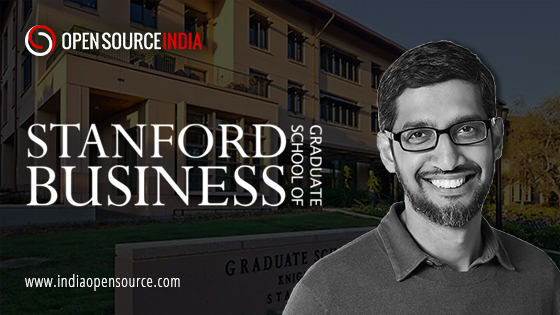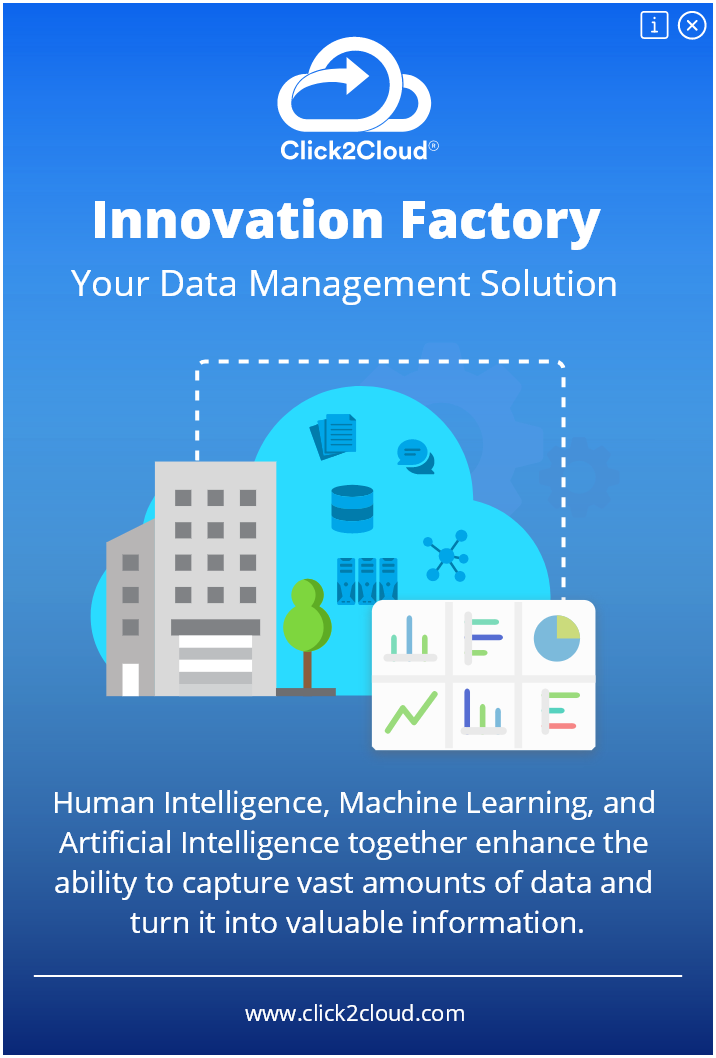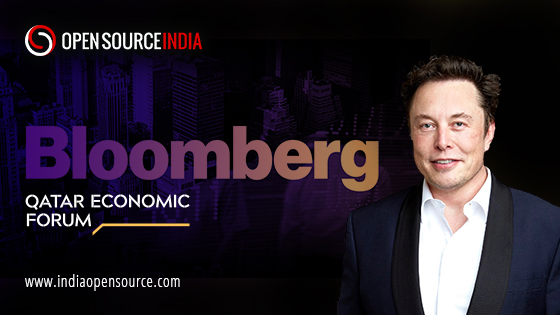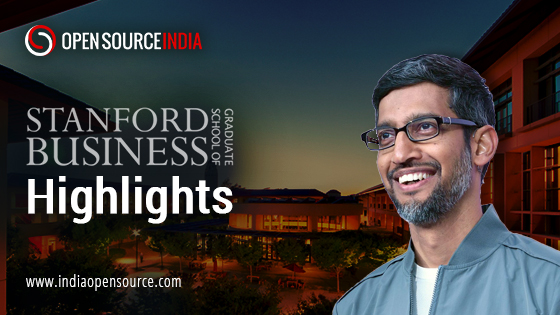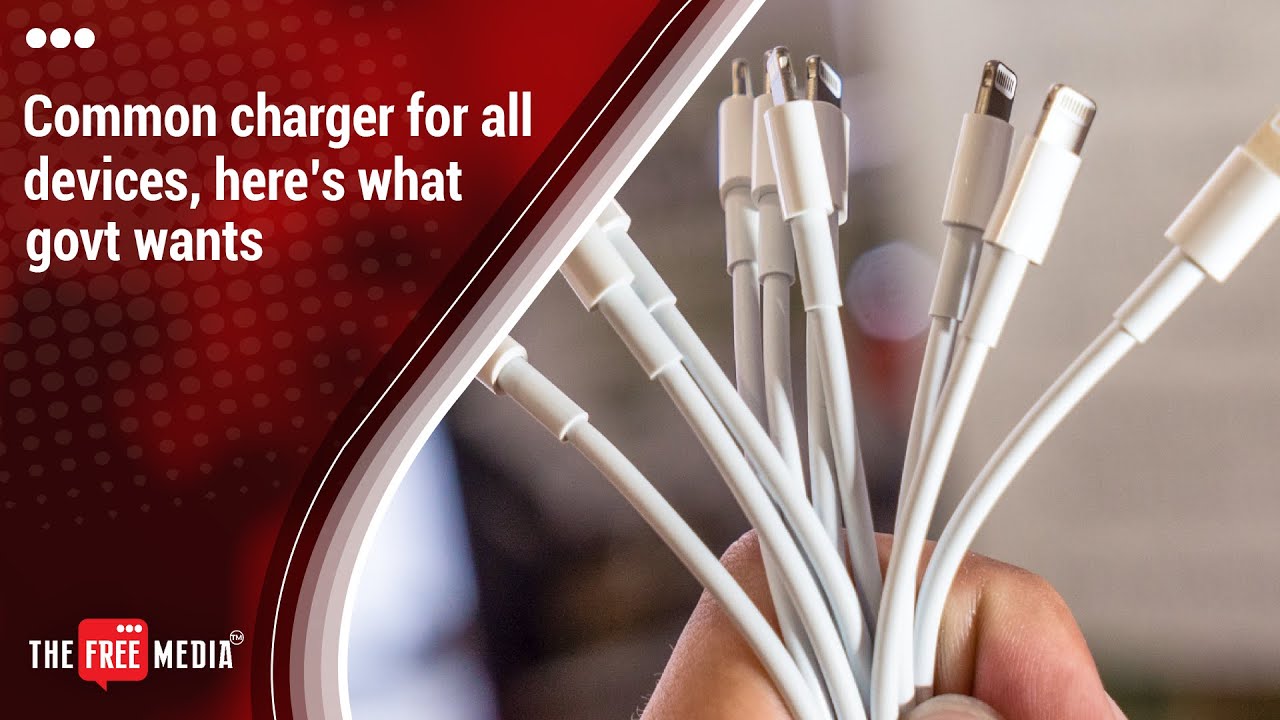Sundar Pichai, the CEO of Google and Alphabet was interviewed at Stanford Graduate School of Business in April 2022 where he talked about the impact f AI on next-generation, Google’s stand on work-life balance, and many other important topics.
The interview started with a fun Wikipedia game where Archana Sohmshetty who interviewed Pichai asked Sundar about the edits made on Sundar Pichai Wikipedia page and tell the audience if they were correct or not. Following this, Sohmshetty started her questions with Sundar. Here is what Sundar was asked and how he responded-
Q. How did you go from an initial delay in technology to devoting your career to access to technology for all?
A. Growing up for me, every technology transition was a very vivid even as a kid because I had to wait for a long time for it. We were on a waitlist for a rotary telephone, it took five years to be on the waitlist and get the form. I would go to get my grandparents’ blood test results and it would be an hour round trip each way and we would go all the way to the hospital and they would say it is not ready today come back tomorrow. And then this phone came and I could call and they cloud tell me whether the results were ready or not and so to me, that was like, super profound. And people who would come to our house to make calls, I saw how it created a sense of community. So, I’ve always had this vivid sense of how technology can make a profound difference and so a lot of what I have tried to do is bring that access to technology. What I got, I got a lot more of it when I came to Stanford. Walking to Street Hall at that time and seeing rows of computers was life-changing for me. I was very inspired by Negroponte’s one laptop per child project. And even today lot of what I am able to do at Google, be it making cheaper phones through android, bringing the next billion people online, or Chromebook and try to make affordable laptops and hit close to that mission.
Q. Why did you decide to leave academia (Ph.D. in Material Science)?
A. I literally came to Silicon Valley, for me, it was asked literal. It was a place where semiconductors were built, I came here for the silicon in Silicon Valley. And, I did my Ph.D. student in material science, I was studying semiconductor physics and definitely, that’s what I thought I would do. A few things, one is, I was surrounded by other grad students who had worked on at the time what was the rage, it was superconductors, what was called, high TC superconductors. And I realized many of them had spent their life and it didn’t happen and so that gave me a pause. I think something you all probably deal with being in valley, there’s so much happening outside. There’s a lot that beckons outside and so, I was definitely interested in that. I had financial reasons to go get a job and so the combination of all that made me go out and be in the industry and in a great learning moment. The semiconductor industry is extraordinarily cyclical. In my first year of the company at work, we hired 3000 people, and the next year we laid off 1700 people. And so, you get out and you go through that life learning. But, that was the early days of the internet too, and definitely seeing what the promise the internet had and connecting it back to what I wanted to do was what led me find my way back to Google. And I went to business school along the way, not here, but another great school, and eventually made it back to the valley.
Q. What drew you to stay at Google over the past 20 years?
A. It’s been very busy, partly that, and you know, I mean it’s an extraordinary place. I think the breadth of talent you see, the kind of projects you get exposed to, you are on the cutting edge of everything all the time, so definitely I enjoy that. A big part of it is, if you look at our products, search works everywhere around the world, we take pride in providing it, and its accessible to everyone as long as they have computing and connectivity, whether you are here at Stanford or a kid in rural Indonesia, Google worlds for you, and that’s the philosophy we bring across our products. Be it Gmail, be it maps, be it YouTube. So, we think about scale, being able to reach people and make technology more accessible and it’s what I wanted to do in my life, so that’s a privilege to do it.
Q. Where did the conviction come from, and how did you convince skeptics that chrome was the future?
A. Now that time Eric was our CEO, Eric Schmist, and I remember him being angry once, it’s because he realized we were trying to build a browser and he was like, do you know what it takes to build a browser? Because he had gone through the browser battles. He was hesitant for us to do it. Partly how did I do it. I didn’t tell people for a while, just had a small team and you know worked on it. And only when we had something to show, we had a chance to show the product and that got people excited. But it’s a good lesson. I think if you have a set of committed people, passionate people you can achieve, even I couldn’t have foreseen what I would eventually become, but shows the power of a small group of committed people and actually not knowing the odds of what you are working on. So, I think both helps.
Q. Over the years what do you think Google has done well as it scaled?
A. It is a complex thing scaling a company. I would say things we have gotten right- the first thing that struck me about Google when I joined the company, it was very different in sense that it was a very optimistic place. So, there are places in which if you walked the hallways and you spoke to people and you had ideas, people expanded on them. Most of the time people try to tell you why things won’t work, I felt the spirit was different (at Google), people would tell you “Oh! That’s a great idea”, you could do it this way and it would be better. So that struck me, that optimism, the fact that you can innovate, make things better, solve problems. I think it is the spirit of trying to create now and it takes a lot of hard work. You have to encourage innovation. One of the counterintuitive things is companies become more conservative as they grow. They have a lot more cash, they have a lot more resources but companies tend to become more conservative in their decision-making, so encouraging the company to take risks and innovate and be okay with failure and reward efforts, not outcomes, and that’s very hard to do in an organization. People tend to reward outcomes and which means over time organizations become more conservative, they take safer bets, and so on. So, a lot of scaling is about making sure you preserve the good things you had in the early days that gets harder as the company becomes bigger. You have to work hard at it. But I think a big part of what we try hard to do is keep that culture of innovating with technology, building products, shipping things. So that’s one of the many things.
Q. What were some of the other kind of growing pains that you’ve seen Google have over the last couple of years.
A. Definitely a lot. When you are a small company, think about the size of the business schools all of you have shared context. You understand better what others are going through and so you have better context around everything that’s going on a larger company definitely gets harder. Google was built on everyone. It’s a very open culture. Even today, one of the most common things people tell me when they come from other companies is they’re shocked at how transparent the company is, you have literally access to what’s happening across the company. But it can be overwhelming and just because you have transparency doesn’t mean you have context. It’s very different from when organizations are smaller. So, that’s been a big part of trying to figure out how to scale up the company. And how do you organize more independently coordinate only when needed, but can have more parts of the company move smaller units. And that’s a hard balance to get right.
Q. How should we be thinking about AI to help humanity versus harm humanity?
A. It’s a great question. When I became CEO, one of the biggest directional changes we made, as we said, we are going to approach everything as AI-first and we’re applying it across everything we do in the company. It’s a big part of R&D we spend, and the progress is palpable every year. It’s exciting there’s a lot of progress. I think we concretely see the evidence of, just when you look at the scale at which translation works, or in search how we use AI or in Gmail when you type and we give suggestions, it’s applied across all our products so, definitely, we can see the path by which we’re making things better. I think (AI) will profoundly transform pretty much every sector. You see the potential in areas like healthcare, I think it’ll still take a decade for it to fully play out but we definitely see the potential. I think to your question of how do you make sure we develop it in a way, I think that the essential struggle of humanity with every technology is harnessing it so that it benefits society. You can see the same debates about the internet, even before you think about AI, has the internet been a force of good? Obviously. Has it had effects, which we didn’t fully anticipate? Yes, and that’s the debate we are working about how best to address it. With AI I think we need to think about it earlier. So, part of how we are approaching, we have clearly articulated publicly a set of AI principles, and publicly stated it and we publish a lot of research, we open source technology, but that’s the only part of the problem. I think academic institutions need to play a big role. We were a founding member for Stanford’s AI institute HAI and proud to be a supporter there. I think they are doing terrific work. But in academic institutions, non-profits and the public-private partnership government will end up having a role. There has to be thoughtful regulation about AI. You have to get the balance right so that there is innovation but I think it’s important to think it through earlier than other technologies. So, doing it and engaging all the stakeholders is the only way I can think of approaching it.
Q. How are you thinking about the future of quality connections with each other, as technology becomes a larger part of our lives?
A. I mean, look the technology is the enabler. Ultimately, it’s people in the society, we have to organize around how we organize technology. I think you are raising a very important point and, thinking through about how technology is not isolating, or immersive in a way in which it prevents you from engaging, I think genuinely is a good topic. I think all of us who have kids, worry about it and struggle about it. I did like when our sons were playing in the school band, it’s what you want them to see them do more of. But every generation is always very worried about technology of the future. It’s always been true when you look back at it, and so I think that’s the part of the process. Technology done correctly, can enable interactions in the real world. One of the companies we spun out of Google which was Niantic I did that precisely, with Pokémon and got people to move about and do stuff in the real world which I found inspiring, but I think over the time part of even if we get augmented reality right, today when you see people on their phones walking on the screens immersed, you see that in some ways technology forces you to engage with it. It hasn’t adapted enough to how humans live life. So, part of solving, more natural ways by which you can interact with computing, be it voice, be computing understanding what you’re looking at, may actually help us do this better than wrongly can be even more isolating, but done correctly with the right attributes, Ithink that can help bridge that gap. And so I think that’s the potential for AR if done correctly.
Q. As the events were happening (walkout for women’s rights and acquisition of misleading the treatment of minorities), what was going through your head? What was your reaction?
A. One of the fortunate things I felt, as most companies, from day one Google has had a strong employee voice. And for me as a CEO running a large company, always found it helpful. Because you trust your employees to get it right at scale. So, I viewed it as a strength of the company, when employees speak up. I think it’s important for us to take it seriously. The walkout was the moment when the company hadn’t gotten something right and that’s what the walkout was about. So, internalizing it, acknowledging it, owning up to it, committing, and making the company better is how you approach those moments. And, even today, I think employee input is something as a company, we value deeply, and I would argue, they push the company to be better across all the things we do. It is complex as I said earlier, the context around these decisions, some of these decisions are always hard, and at scale, not everyone has the full context. But for what it’s worth, I’ve personally always felt one of the strengths of the company. And when it comes to getting AI right or doing the things at scale, and getting it right. We do it in many countries around the world, and I still take great comfort in knowing that our employees deeply are guardians of our values and we’ll do everything to get it right.
Q. How are you thinking about promoting DS&I, Diversity, Equality and Inclusion at Google moving forward?
A. One of the most important moments as a company we went through and I think many companies around the world, was the racial equity moment around the murder of George Floyd. As a company for us, it was a profound moment internally. I have never seen anything affect the company that much in the 16 years. We publicly committed to, and I consulted and work with our black leadership advisory group in the company. And understating most of the company, wanted to do the right thing, tapping on the moment and converting it into a lasting commitment. So, we publicly committed to a set of initiatives and we’re holding ourselves accountable. We give transparency reports on how we are making the progress on that. And be it committing to improving our leadership representation from underrepresenting groups, be it committing to driving improvements in our products. Last year in pixel in our camera technology, we launched real tone in a more inclusive way to capture pictures to cover all skin tones. I mean, these are all examples of how you can use technology to make progress here. Scaling and giving more people access to technology, particularly in underrepresented groups. These are all the commitments we have made. That’s one part of how we work through moments like those.
Q. How did you integrate competing preferences when crafting your future of plan work?
A. For what’s its worth, I am incredibly excited about this next face of how the future of work, and I think 20 years ago, Google was kind of it’s now done so much around the valley, people take it for granted. But google did rethink what workspaces cloud be. They thought workspaces could be fun, we had slide in our offices, we changed the workplaces pretty radically. We gave people a lot of agency, our employees had a lot of agency. It felt fun to be in the offices. We didn’t think that was at odds of being productive. So, the sense of creating community, fostering creativity in the workplace, collaborations all makes you a better company. I view giving flexibility to people the same way. To be very clear, I do think, we strongly believe in personnel connections. But I think we can achieve that in a more purposeful way and give employees again more agency and flexibility. So, I think hybrid work is great. We’re going to leverage the scale of the company. We have many locations around the world so people can move to other places and work. We are starting with a three-two hybrid option. But we have encouraged employees to apply to be fully remote as well, and we have supported 85% of those applications. So, I am excited, you earlier asked about diversity, one of the best ways we can now approach diversity is actually showing up in places where diverse talent is. More importantly, when we get that talent than being in communities which have the supporting structure for them. And, so we are now in Atlanta, in Chicago, in DC, recruiting employees. I think being able to support the participation of women in the workforce, I think the flexibility is going to be a huge asset. So, I am excited by it and I think I find people come back and people are very excited to come back to the office by the way, as they have opened up we are easily at over 70% already back to our pre-pandemic presence in the offices and its growing. But giving people that choice it always bothered me that the stress around commutes or when people at parent-teacher conferences or doctor appointments, balancing all that, there is a lot of stress which people are carrying. So, I think this gives us a chance to rethink. Also say technology, since we build products like Gmail, Docs, Meet, and so on, it gives a chance to rethink the products too and make it all work better. So, I think it’s one of the most exciting things that’s happening in the workforce and I think you’ll see the benefits of it over time.
Q. When is it appropriate for corporations to step in on public issues like Ukraine and Russia?
A. First of all, for us, we are directly involved because both we have employees in Ukraine and Russia. Our products work in these regions, being an information company at moments like this, it’s really critical for us to get these moments right. So, we approach it a few ways. Foremost, the safety of our employees like every other organization, making sure employees are safe. The second very critical for us is getting access to information right, tackling misinformation, removing what we felt were propaganda information. And raising what we do in search and YouTube at moments like that is raising higher quality information, including providing information within Russia at moments like this. It’s a large part of the work we do. Launching important things like air raid alerts on Google maps in Ukraine. Being in Warsaw, one of the things that struck me and it’s true for pretty much everyone there, an average google employee had two to three refugee families with them. These are mainly women and children. People don’t speak the same language all the time, people using google translate on their phone to communicate. So, we had to do a sprint to get the language translation working right. We opened up a portion of our space to NGOs as well as entrepreneurs from Ukraine and more importantly, we committed to investing in Poland. So, we announced a $700 million investment, both in-office space and to hire more people in Poland, and we are going to commit to investing in central and eastern Europe at this pivotal time. But I think definitely the war shows how much we have to continue fighting for and so it’s an important moment to get right.
Q. How do you choose which causes you want to invest your time and effort into?
A. With the company at scale there’s a lot of things that come your way. I think you have to be disciplined about where you think google can make a difference and what is the unique perspective or value proposition you can bring to the table, and over time we have understood the things we can do and the things other organizations are better at doing. An area, for example, given our focus on information, skilling has been a big focus for us, digital skilling. I think there’s no substitute for college but unfortunately, not everyone can have access to and can afford to go to a college so skilling people and giving them access to digital skills has been a big push. In the US, we have launched a career certificate program. It’s a nine-month program, we have done it in four major areas and we back it up with working with employers to recruit people. And its neem extraordinary successful, 7500 people have gone through it, and almost 50% of it is from the underrepresented group, and when I look at the demand there is from people for these things, so I think this is the society we need to figure out about how we can scale and give access to digital skilling to more people. So, that’s an area where I feel Google can strongly contribute, and so we choose and get involved in these areas like that, sustainability is one of the ones, So we choose where we think we can add value.
Q. How are you going about getting the whole company to rally behind the goal of sustainability?
A. One of the important things and if I could clarify, one thing, we have been carbon-neutral since 2007. So, Google has been carbon neutral since 2007 and is one of the earliest companies to do so, sustainability has long been an important goal. What we have now committed is by 2030, to be carbon-free, so not using offsets, but actually running our operations 24/7 carbon-free, that is a hard challenge because today we can use offsets and that involves investing in developing new technology beyond wind and solar and be carbon capture, how do you store energy, and to don it around the world. But it excites us because it’s a lot of R&D again, and you can apply technology. When we bought some of the earliest wind and solar contracts in 2010, costs have fallen by 85% in the last 10 years. And so again, looking at these new technologies, we just have a whole data center now up and running with geothermal, and so tapping into new technologies, and we want to bootstrap it and help drive the technology and the cost curve over the next decade so that we can reach there. But, it’s a challenge and it stresses out, but (I am) incredibly exciting as a technologist and the chance to make progress.
Q. What motivates you to go above and beyond what is expected of a business leader?
A. I would tie it back to the first question, at least in the context of the work I do. I travel around the world, and I still today, particularly when you go into emerging markets, it’s a very different view from here. You see, how eager people are to get access to technology because they understand how it’ll make their lives better. So, you see it, you feel it, when I go to Vietnam or India or Africa, and there’s a lot more work to be done. Just in India recently, we are working on a cheaper, high-quality smartphone maybe around the $30 price point. And last week we just announced in Africa our product development center in Nairobi, hiring engineers and UX designers, and so on. When you see the appetite and the desire for people to make their lives better by gaining access to technology, that’s what compels me to go beyond. And I think it’s very consistent to do with what our company has set out to do.




